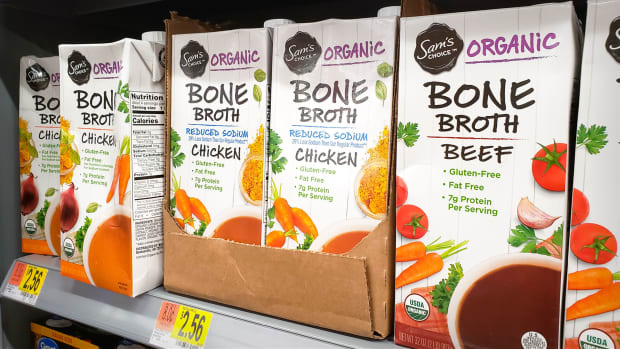Ah, private label brands — the Kirkland seltzers you always stock up on at Costco (COST) and everything from the peanut butter-filled pretzels to the international frozen food section at Trader Joe's.
Launched by the same retailer under a separate brand, the private label product has a lot going for it -- they let their creators reap all of the profits (instead of sharing them with the manufacturer) while, on the customer side, they can become as beloved as everything-but-the-bagel seasoning.
But not every private label brand is a success and some are clearly more popular than others. A recent survey by data company Numerator found that the five most popular private label brands are Great Value (72.7% of survey respondents bought it), Equate (51%), Marketside (44.2%), Freshness Guaranteed (40%) and Dollar Tree (DLTR) (32.5%).
With the exception of Dollar Tree, four out of the five brands above are produced by Walmart (WMT).
Walmart, Walmart Everywhere
"The days of treating private label products as untrackable are over,” Numerator's Chief Executive Eric Belcher said in a statement. "With market share now approaching 50% in some major categories, CPG manufacturers need visibility into the brand-level performance of private labels today more than ever before."
But while Walmart beat all others due to the sheer number of stores available across the country, certain brands invest more in private labels than others — 77.5% of the sales at Aldi's came from private labels. That number was at 59.4% for Trader Joe’s, 49.4% for Wegmans, 33.5% for Costco and 30% for Sam's Club.
Aldi, Target (TGT) and Amazon's Basics (AMZN) were the private label brands that were growing at the fastest rates.
Walmart, by contrast, had only 23.3% of its sales come from private labels while the rest came from other brands it stocks.

Shutterstock
"When a retailer carries lines from third-party vendors, the profits are split between the two," Cathaleen Chen wrote for TheStreet in 2018. "With private lines, vendors are kept out of the picture and the retailer reaps the gains."
Price Or Brand Name?
One key finding was related to the financial comfort of the people buying private label products.
The long-standing stereotype is that only low-income people go for no-name or private label brands. But retailers hawking in-house products had surprising news.
In the study, the differences between household incomes was infinitesimal. In fact, while 17.1% of the private label market share came from low-income families, higher-income households made up 17.2%, according to the report.
What's more, 56.9% of high-income buyers held a favorable view of private label products while only 52.5% of low-income shoppers did.
While the study did not delve into the price differences between private label and designer products (some of the former are getting quite expensive as the manufacturer presents them as 'luxury' products), private label has traditionally been a way of saving money.
Some analysts estimate that the average private label brand costs between 20% to 40% less than a similar branded product.
In 2021, Walmart announced that it was launching a private-label insulin that it promised to provide at 75% of the cost of branded analog products which, at that time, were priced at $72.88 for vials and $85.88 for the FlexPen.
"As inflation continues to rise, price is becoming more important than brand name for many consumers," reads the report. "In recent months, the number of consumers who say price is more important than brand name has grown across all income levels."







